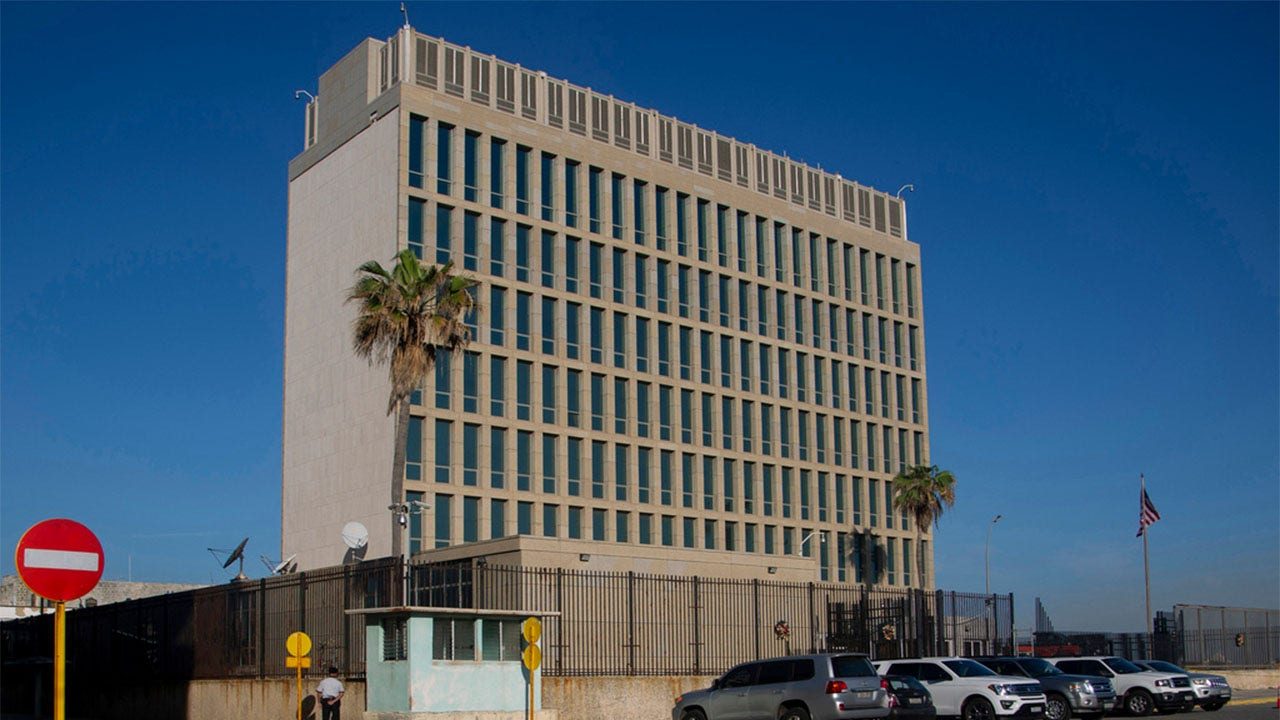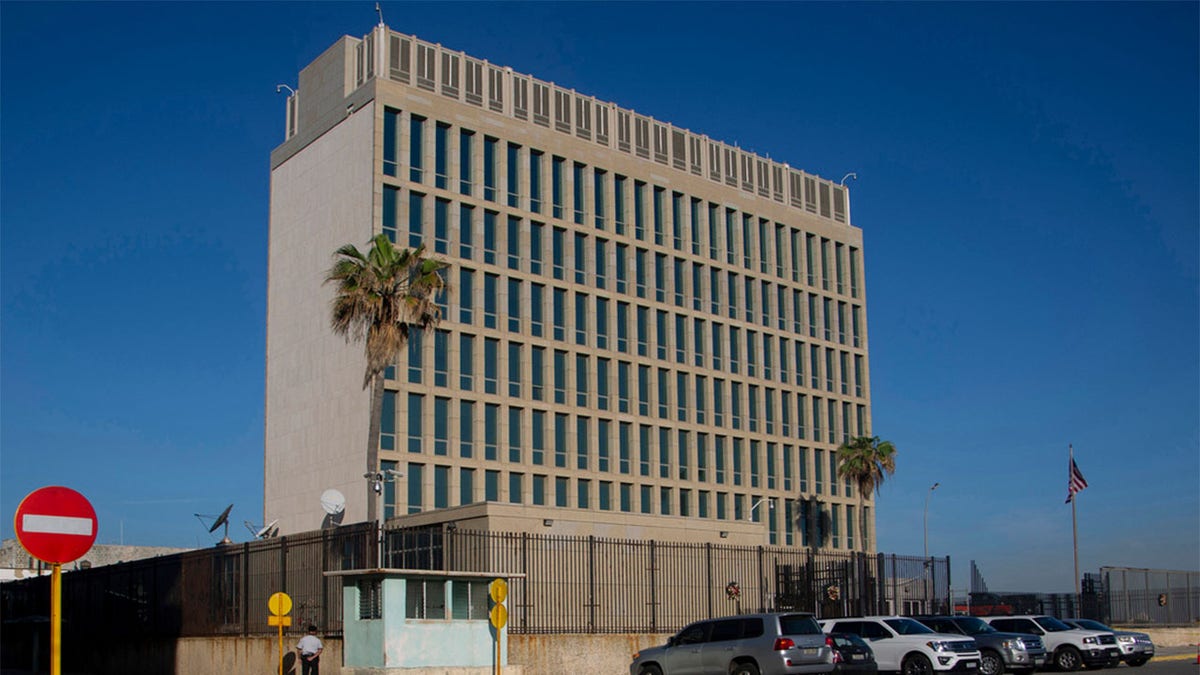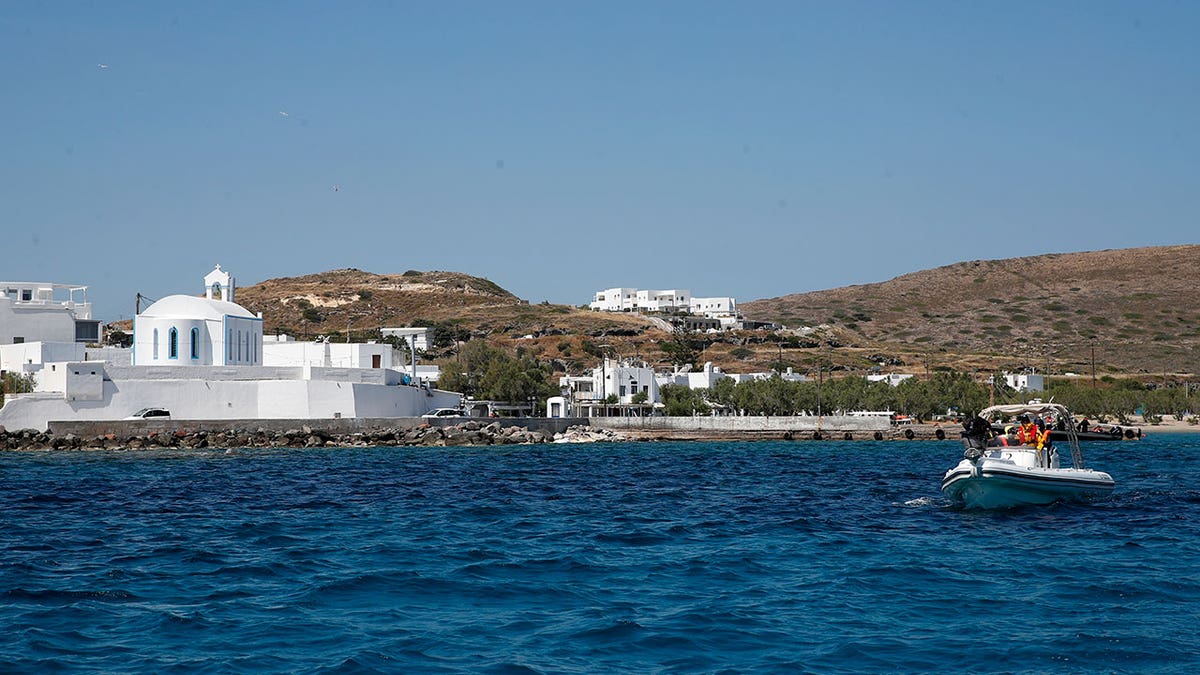INTERNACIONAL
Florida car chase in 2020 may be linked to Havana syndrome: report

A high-speed chase in Florida may be linked to the mysterious phenomenon known as «Havana syndrome,» according to a new report.
U.S. and Canadian embassy staff first reported the condition in Cuba in 2016, and it was later reported by hundreds of American personnel in multiple countries.
A promotional clip of a story from CBS News’ «60 Minutes,» set to air later Sunday, shows bodycam footage of police chasing a car down a highway in Key West in June 2020. The chase goes on for 15 miles, with the driver topping speeds of 110 mph.

The U.S. Embassy in Havana is seen on Jan. 4, 2023. (Havana Syndrome Study)
Eventually, he’s pulled over and apprehended. Inside the man’s car, officers found bank account notes and a device resembling a walkie-talkie that can erase a car’s computer data, including its GPS history.
Officers also found a Russian passport. The suspect gives his name as «Vitalii» and says he is from St. Petersburg.
When asked why he fled from police officers, he repeatedly says, «I don’t know.»
The report comes weeks after the release of a nearly five-year study from the National Institutes of Health, which found no explanation for the mysterious health problems – including headaches, balance problems and difficulties with thinking and sleep – that have been reported by U.S. diplomats and other government employees. The NIH conducted an array of advanced tests but found no brain injuries or degeneration.
TRUMP SUGGESTS REGIME CHANGE IN COMMUNIST CUBA AS ECONOMY WORSENS
The NIH did appear to contradict some earlier findings that raised the specter of brain injuries in people experiencing what the State Department now calls «anomalous health incidents.»
Sophisticated MRI scans detected no significant differences in brain volume, structure or white matter — signs of injury or degeneration — when Havana syndrome patients were compared to healthy government workers with similar jobs, including some in the same embassy. Nor were there significant differences in cognitive and other tests, according to findings published in the Journal of the American Medical Association.

A view of Havana (Frédéric Soltan/Corbis via Getty Images/File)
While that couldn’t rule out some transient injury when symptoms began, researchers said that was good news that they couldn’t spot long-term markers on brain scans that are typical after trauma or stroke.
Sunday’s report is the latest episode in an ongoing saga to unravel a mystery that began when personnel at the U.S. Embassy in Cuba began seeking medical care for hearing loss and ear-ringing after reporting sudden weird noises.
Early on, there was concern that Russia or another country may have used some form of directed energy to attack Americans. But last year, U.S. intelligence agencies said there was no sign a foreign adversary was involved and that most cases appeared to have different causes, from undiagnosed illnesses to environmental factors.
CLICK HERE TO GET THE FOX NEWS APP
The NIH study, which began in 2018 and included more than 80 Havana syndrome patients, wasn’t designed to examine the likelihood of some weapon or other trigger for Havana syndrome symptoms. Chan said the findings don’t contradict the intelligence agencies’ conclusions.
The Associated Press contributed to this report.
INTERNACIONAL
Greece proposes 2 marine parks as part of $830M environmental protection program

- Greece plans to establish two large marine parks aiming to safeguard biodiversity and marine ecosystems.
- Prime Minister Kyriakos Mitsotakis said the expansion of marine protected areas by 80 percent will involve banning harmful fishing practices and implementing new monitoring technologies.
- Greece intends to build marine parks in the Ionian and Aegean Seas, covering over 30 percent of its waters.
Greece aims to create two large marine parks as part of an $830 million program to protect biodiversity and marine ecosystems, with the plans to be formally announced at an international oceans conference starting in Athens Tuesday.
But the plan has irked Greece’s neighbor and regional rival, Turkey, while environmental organizations say the initiative doesn’t go far enough, noting that the country also allows environmentally harmful practices such as energy exploration in sensitive marine environments.
«We are increasing the size of our marine protected areas by 80%, banning harmful fishing practices and using new technologies to monitor and enforce the commitments we make here,» Prime Minister Kyriakos Mitsotakis said ahead of the conference.
IS THIS TECHNOLOGY THE ANSWER TO CLEANING UP OUR OCEAN’S PLASTIC PROBLEM?
The two-day international meeting being held in Athens aims «to catalyze global action against two overlapping crises, the climate crisis and the crisis of our ocean,» Mitsotakis said. «Countries have come with specific proposals to take decisive action.»

Medical staff in a dinghy are seen in a boat near the Aegean Sea island of Milos to Sikinos island, Greece. Greece aims to create two large marine parks as part of a $830 million to protect biodiversity and marine ecosystems, with the plans to be formally announced at an international oceans conference starting in Athens on Tuesday. (AP Photo/Thanassis Stavrakis, File)
With thousands of islands and islets and one of the longest coastlines in the Mediterranean, Greece has said it will create one new marine park in the Ionian Sea and one in the Aegean Sea, bringing the total area of marine protected areas to over 30% of its waters.
But environmental organizations have called for stronger commitments to environmental protection.
Under a slogan of «The sea is not for sale,» Greenpeace urged leaders attending the Our Ocean Conference in Athens to take concrete measures to protect the world’s marine environment.
CORAL REEFS AROUND THE WORLD ARE EXPERIENCING MASS BLEACHING IN WARMING OCEANS, SCIENTISTS SAY
The conference «must not be simply an opportunity for governments to congratulate themselves for what they have said until now,» said Nikos Charalambidis, head of Greenpeace in Greece. «On the contrary, this must be where serious steps and action plans are presented to prevent the looting of our seas.»
Greenpeace, the World Wildlife Fund and other organizations have leveled particular criticism at Greece for allowing deep-sea seismic exploration for energy and mineral resources in the Hellenic Trench, which includes the deepest waters in the Mediterranean at more than 5,200 meters (17,300 feet).
The trench, which stretches from southwestern Greece to Crete, is a vital habitat for the Mediterranean’s few hundred sperm whales and for other marine mammals already threatened by fishing, ship collisions and plastic pollution.
Asked whether the Greek government planned to extend protection to the entirety of the Hellenic Trench, Theodoros Skylakakis, Greece’s minister for both the environment and energy, stressed that adapting to a green economy requires significant funds over the coming decades.
«We need to be a lot more efficient in everything we do. And not trigger our reaction by ideology but rather trigger it by science, by efficiency and by investment,» Skylakakis said. «And for that, we will need money. If anybody thinks we can meet this challenge of paying for the adaptation … and at the same time don’t have economic growth, they don’t live in this world.»
CLICK HERE TO GET THE FOX NEWS APP
Greece’s plan for the two marine parks has also irked its neighbor and regional rival Turkey. When the plan was initially aired last week, Turkey’s foreign ministry accused Athens of exploiting environmental issues to push its geopolitical agenda. The two countries, both NATO members, have been at odds for decades over a series of issues, including territorial claims in the Aegean, and have reached the brink of war three times in the last 50 years.
Relations have improved somewhat over the past year following a period of heightened tensions that saw the two countries’ warships facing off in the eastern Mediterranean. But Ankara responded with annoyance to the plan for a marine park in the Agean.
«It is known that Greece has long been trying to benefit from almost every platform in the context of Aegean problems,» the Turkish Foreign Ministry said. «Despite the recent softening in our relations, it appears that Greece is exploiting environmental issues this time.»
Greece’s foreign ministry retorted that Ankara was «politicizing a clearly environmental issue.»
-

 SOCIEDAD1 día ago
SOCIEDAD1 día agocon fuerte participación de argentinos, arranca en Grecia una mega cumbre para proteger el mar
-

 INTERNACIONAL2 días ago
INTERNACIONAL2 días agoTensión en Oriente Medio: el G7 condenó el ataque a Israel y advirtió a Irán que no siga desestabilizando la región
-

 INTERNACIONAL3 días ago
INTERNACIONAL3 días agoMáxima alerta en Medio Oriente: Irán lanzó un ataque sobre Israel con decenas de drones
-

 POLITICA18 horas ago
POLITICA18 horas agoEl Ejecutivo recurrirá a la Justicia para frenar los amentos en las prepagas
-

 POLITICA2 días ago
POLITICA2 días agoAtaque iraní a Israel: por seguridad, la Cancillería ordenó el cierre de las embajadas argentinas en Medio Oriente
-

 POLITICA24 horas ago
POLITICA24 horas ago“No descarto ningún atentado, ni en Argentina ni en otros países”, sostuvo el presidente de la DAIA





























